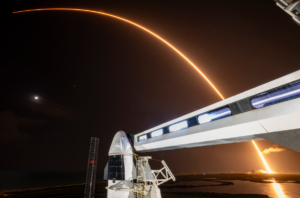FAA Suspends Falcon 9 Launches To Investigate Landing Failure
The FAA is requiring SpaceX to suspend flights of the Falcon 9 rocket until an investigation into this morning’s landing failure is complete. Whether that takes hours, days or weeks remains to be seen, but until then Falcon 9 launches including Polaris Dawn will have to wait.
Last night SpaceX postponed the launch of the four-person Polaris Dawn mission that was scheduled for 3:38 am ET this morning from Kennedy Space Center, FL. The problem was bad weather expected not during launch, but at the end of the mission on Monday. The crew is not visiting the International Space Station so only has enough supplies for five days and must return at that time.
The company proceeded, however, with a completely unrelated launch of more Starlink satellites for SpaceX’s satellite Internet broadband system on a Falcon 9 from the adjacent Cape Canaveral Space Force Station (CCSFS).
The launch of Starlink 8-6 with 21 Starlink satellites went perfectly at 3:48 am ET using the B1062 first stage. SpaceX reuses the first stages of the two-stage Falcon 9 rocket. After separating from the second stage, the first stage returns to Earth and lands either on an autonomous drone ship at sea or back at CCSFS. This was the 23rd flight of B1062.

For the first time since February 2021, however, the landing did not go well. Amid flames, the booster tipped over when it made a hard landing on the drone ship Shortfall of Gravitas, falling into the ocean as seen at the end of this SpaceX video.
Watch Falcon 9 launch from Florida with 21 @Starlink satellites https://t.co/u0TT6F9LpM
— SpaceX (@SpaceX) August 28, 2024
SpaceX was planning to launch another set of Starlinks on a Falcon 9 from Vandenberg Space Force Base, CA two hours later, but decided to postpone it.
Standing down from our second @Starlink launch of the night to give the team time to review booster landing data from the previous launch. A new target launch date will be shared once available
— SpaceX (@SpaceX) August 28, 2024
This afternoon, the FAA issued a statement that while there were no injuries or property damage to the public, it was requiring an investigation before Falcon 9 launches again.

The FAA told SpacePolicyOnline.com that it similarly investigated the February 2021 landing failure. That was also a Starlink launch. SpaceX’s Starlink constellation consists of thousands and thousands of satellites launched since 2019, about 6,000 so far and counting.
The vast majority of Falcon 9 first stages are recovered and reused, with 322 successful landings so far out of 365 launches.
The Falcon 9 second stage worked fine and the new 21 Starlinks are in their intended orbits.
SpaceX has a very busy Falcon 9 launch schedule for its own Starlinks, satellites for other customers, and human spaceflight launches for NASA and private customers. The company recently had to suspend launches because of a launch failure, but resumed operations after just 16 days.
That delay also affected Polaris Dawn, which had been scheduled for July 31. When SpaceX postponed it last night, the plan was to launch no earlier than this Friday. Whether this investigation will be done by then remains to be seen and then, of course, the weather must cooperate as well. The company is also preparing to launch the Crew-9 mission for NASA on September 24.
User Comments
SpacePolicyOnline.com has the right (but not the obligation) to monitor the comments and to remove any materials it deems inappropriate. We do not post comments that include links to other websites since we have no control over that content nor can we verify the security of such links.